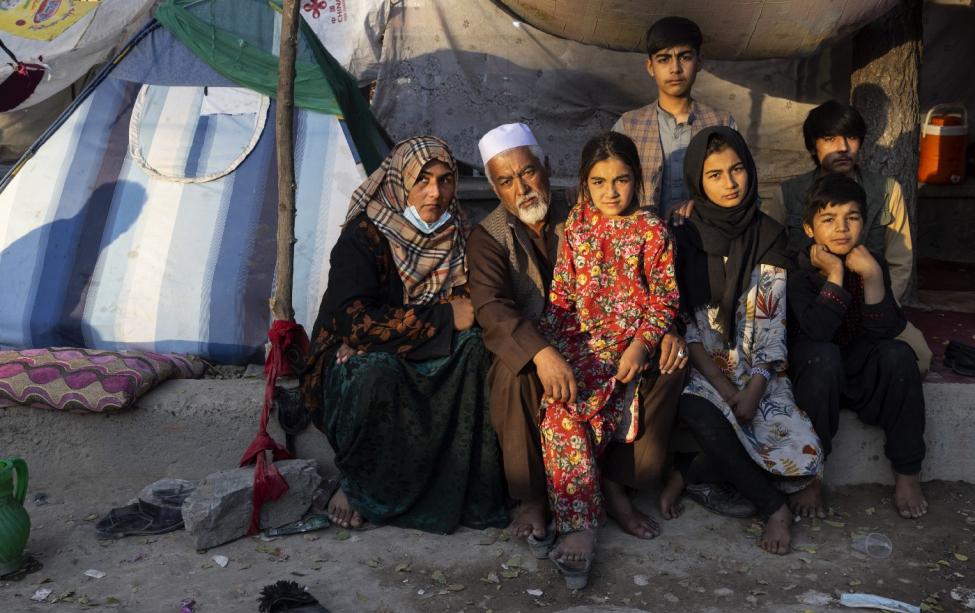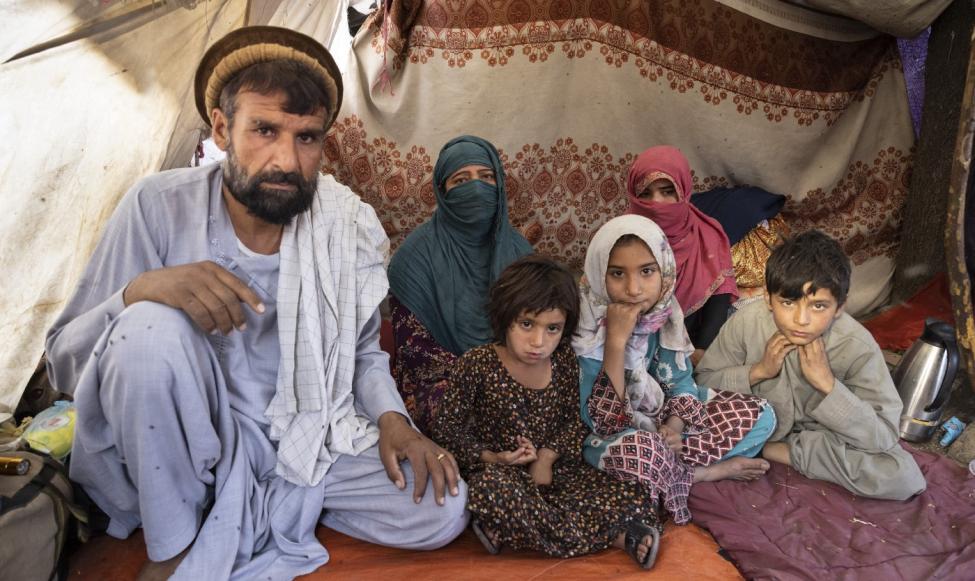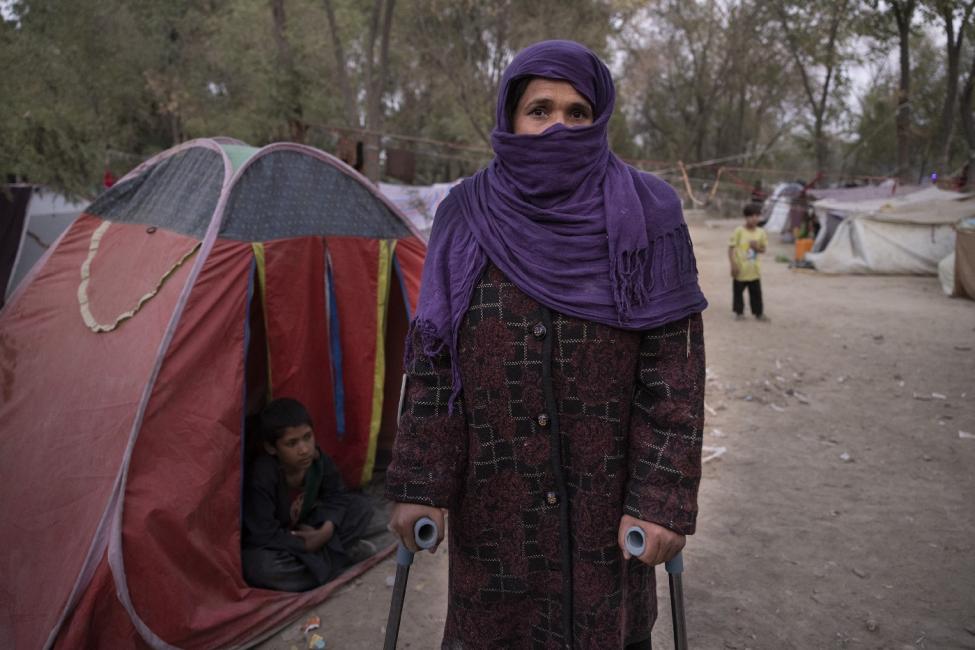-
Who We Are
WHO WE AREThe International Organization for Migration (IOM) is part of the United Nations System as the leading inter-governmental organization promoting since 1951 humane and orderly migration for the benefit of all, with 175 member states and a presence in over 100 countries.
About
About
IOM Global
IOM Global
-
Our Work
Our WorkAs the leading inter-governmental organization promoting humane and orderly migration, IOM plays a key role to support the achievement of the 2030 Agenda through different areas of intervention that connect both humanitarian assistance and sustainable development. Across Asia and the Pacific, IOM provides a comprehensive response to the humanitarian needs of migrants, returnees and host communities.
Cross-cutting (Global)
Cross-cutting (Global)
- Where we work
- Take Action
- Data and Resources
- 2030 Agenda
Kabul, Afghanistan — Nabila Karimi cares for her brother’s six children, all under the age of 14, in a small tent in an internally displaced persons (IDP) site. She had no choice but to take them in after their mother died during a firefight and their father remained in Kunduz suffering from injuries and health issues.
Nabila is just one of over 5.8 million people who have been internally displaced by conflict in Afghanistan since 2012. Like many, Nabila came to Kabul to seek vital humanitarian assistance at an IDP camp.
The regime change in August 2021 caused a spike in displacement across all of Afghanistan’s 34 provinces. This development has been exacerbated by the deteriorating humanitarian situation, adverse effects of climate change inclusive of a protracted drought, the COVID-19 pandemic, and an economy on the brink of collapse.
When the Taliban took over her village in Takhar, Halima fled south to Kabul with her three children, all under the age of eight. Halima’s husband suffered from a debilitating heart attack after which she says, “we lost everything.” She now feels regret for leaving her life behind amidst the challenges of navigating the crowded IDP camp in Khair Khana, Kabul.
Halima is not alone. Many people who have been displaced in Afghanistan seek to return to their homes but are faced with pressing needs and challenges that prevent them from doing so.
Some 83 percent of Afghan nationals over 18 years old are unemployed. With the lack of a basic income and the ongoing rise in food prices, access to food has become the most pressing concern for displaced persons in Afghanistan.
Abdul Kayun was barely making enough money to feed his family when fighting and chaos forced him to flee his home in August. “We have no jobs, no home and an uncertain future. We will leave here if we have money to go home.”
Since August, Abdul Haq Kaiyumi, his wife Sima and their five children have been living in the Kabul Shar-E-Naw IDP site located in a local park. The family struggles to live in the center of Kabul with little humanitarian assistance. Abdul is now unemployed and feels little hope for the future. The family seeks to return home as soon as they can afford to travel.
Among the most basic and dire needs of IDPs in Afghanistan are health, protection, and emergency assistance. Only 19 percent of surveyed communities have a functional health clinic located within the confines of their community and the lack thereof of female healthcare workers often determines whether women and girls can access care, and thus IDPs struggle to find vital medical and psychological support needed to overcome the effects of recent political developments and the rapidly deteriorating living conditions around the country.
Three years ago, Shirin lost her daughter and her leg to a bomb blast. Her husband has a lingering problem with substance abuse. Sameem says she has no reason to be optimistic about the future: as a woman with a disability and without money, she is troubled.
The humanitarian situation in Afghanistan remains extremely difficult: More than half of the population within Afghanistan depend on humanitarian assistance, and their human rights remain challenged.
IOM conducts a routine Baseline Mobility and Community-Based Needs Assessment in Afghanistan on a regular basis to identify and target the most pressing concerns for IDPs in Afghanistan. Protection, clean water, food, access to medical care, and financial support are among their most significant needs.
The Organization also conducts community consultations in Afghanistan to screen displaced people for protection concerns. As a part of this initiative, during the month of January IOM provided cash assistance and humanitarian service referrals to 3,939 undocumented returnees and IDPs as a part of a comprehensive case management response which targeted particularly vulnerable individuals.
In January, IOM Mobile Health teams reached 41,601 people with lifesaving health services including reproductive health services for 5,481 female beneficiaries. The Organization screened over 260,351 individuals for COVID-19, provided 2,609 people with PCR tests and supported the administration of 13,300 vaccine doses for the virus. IOM continues to provide psychological support and has reached 1,861 individuals in Afghanistan during January alone.
To address sanitation and hygiene issues facing IDPs, IOM provided 4,306 people in Afghanistan with key hygiene kits and has conducted technical assessments in 809 sites to ensure water quality and safety.
IOM released its updated Comprehensive Action Plan (CAP) for Afghanistan and neighboring countries in February 2022 appealing to the international community for a total of USD 589 million over a period till the end of 2024, including to address imminent needs faced by these IDPs. IOM’s CAP so far has received financial contributions from donors and partners, though more than 75% are still under-funded.



